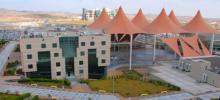University Study Confirms the Effectiveness of Information Processing and Successful Intelligence Theories in Teaching Chemistry

According to a research conducted at King Khalid University by Ayman Taher Muhammad Khawaji, Assistant Director of Education in the Sabya Education Department, creating a teaching model based on modern theories, such as the theory of information processing and the theory of successful intelligence, helped high school first-year chemistry students develop their knowledge and their capacity for creative thought.
The sample of the study, which was supervised by the Professor of Curriculum and Science Teaching Methods at the Faculty of Education, Prof. Abdullah bin Ali Al Kasi, consisted of 64 first-year high school students, who were randomly selected from 2 different schools, and randomly assigned to 2 groups. Group one was an experimental group from Al-Eidabi Secondary School affiliated to the Al-Eidabi Education Office, which included 31 students, who studied the unit that consisted of (Material - Properties and Changes) using the proposed teaching model. Group two from Omar Bin Al-Aziz Secondary School from Sabya Education Office, consisted of 33 students, and was a control group that studied the same unit but without adopting the suggested approach. The study was conducted during the second semester of the academic year 1443AH.
The study was based on creating a teaching model with 7 main stages, each of which has a distinct goal that can be met by a variety of selected teaching techniques, in accordance with a scientific philosophy and flexible method, and gradual and integrated phases between them, as it cares about the quantity and quality of the information acquired, depending on the basis of providing a balanced learning environment explaining the type of activities that should be done, as well as paying great attention to activating the school laboratory effectively. Further, providing a teacher and student guide, where the model is translated into reality and allows the teacher to teach the unit according to the study plan approved by the Ministry of Education (12 lessons / 16 classes), including the necessary tools for teaching each lesson, as well as a variety of educational activities by 48 based on the practice of deep mental processes and productive thinking skills, formulated based on exciting, puzzling and open-ended questions.
In the post-application tests of the depth of knowledge and creative thinking, the study's findings showed that there were statistically significant differences by (0.05) between the mean student scores of the experimental and control groups, favoring the experimental group students. The final outcomes showed that the suggested approach, which was based on theories of information processing and successful intelligence among first-year high school students, was effective.









